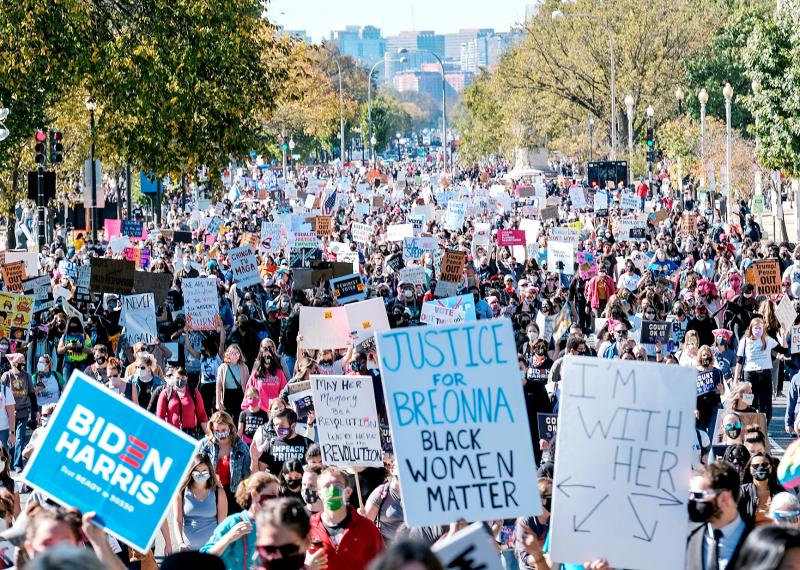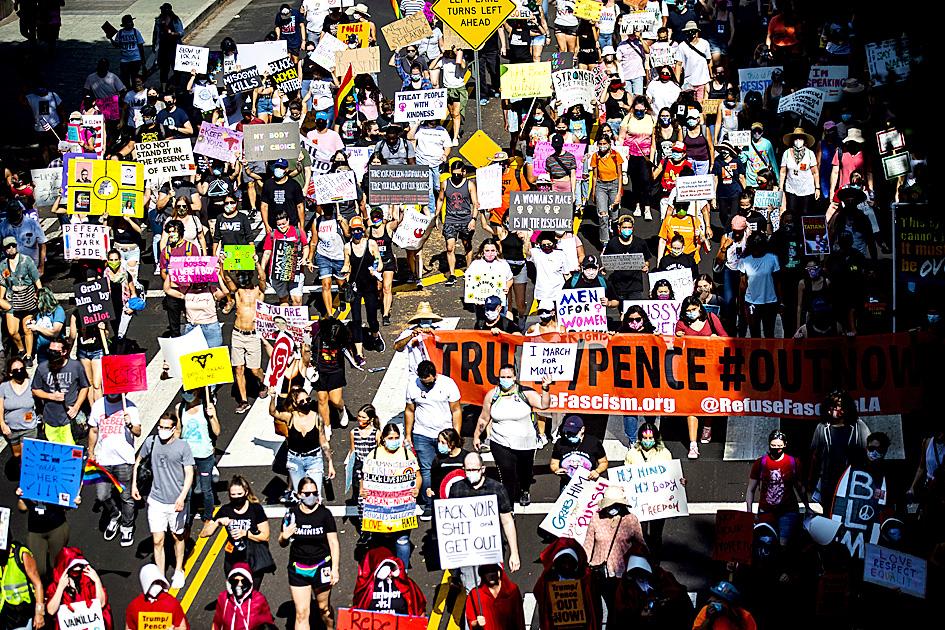Thousands of mostly young women in masks rallied on Saturday in the nation’s capital and other US cities, exhorting voters to oppose US President Donald Trump and his fellow Republican candidates in the Nov. 3 elections.
The latest of rallies that began with a massive women’s march the day after Trump’s January 2017 inauguration was playing out during the COVID-19 pandemic, and demonstrators were asked to wear face coverings and practice social distancing.
Rachel O’Leary Carmona, executive director of the Women’s March, opened the event by asking people to keep their distance from one another, saying that the only superspreader event would be the recent one at the White House.

Photo: Reuters
She talked about the power of women to end Trump’s presidency.
“His presidency began with women marching and now it’s going to end with woman voting. Period,” she said.
“Vote for your daughter’s future,” read one message in the sea of signs carried by demonstrators. “Fight like a girl,” said another.

Photo: EPA-EFE
Demonstrators rallied in dozens of other cities from New York to San Francisco to signal opposition to Trump and his policies, especially the push to fill the seat of Supreme Court justice Ruth Bader Ginsburg before election day.
The US Senate Judiciary Committee has scheduled a vote for Thursday on the nomination of Amy Coney Barrett, a conservative appellate judge.
A march was held at Cornell University in Ithaca, New York, outside the dormitory where Bader Ginsburg lived as an undergraduate.
In New York, a demonstrator wearing a Trump mask stood next to a statue of George Washington at Federal Hall during the women’s march outside the New York Stock Exchange.
“We Dissent,” said a cardboard sign carried by a young woman wearing a red mask with small portraits of the liberal Supreme Court justice whose Sept. 18 death sparked the rush by Republicans to replace her with a conservative.
People wearing masks gathered peacefully under sunny skies on the city hall steps in Portland, Oregon, to sing and listen to speakers.
One speaker called for racial justice and an end to police brutality.
In Washington, the demonstrators started with a rally at Freedom Plaza, then marched toward Capitol Hill, finishing in front of the Supreme Court, where they were met by a handful of anti-abortion activists.
In one of several speeches at the rally, Sonja Spoo, director of reproductive rights campaigns at Ultraviolet, said she has to chuckle when she hears reporters ask Trump whether he would accept a peaceful transfer of power if he loses his reelection bid.
“When we vote him out, come Nov. 3, there is no choice,” Spoo said. “Donald Trump will not get to choose whether he stays in power. That is not his power, that is our power... We are the hell and high water.”
Prudence Sullivan, 49, from Lake in the Hills, Illinois, near Chicago, and her sister Kelli Padgett, 47, from Jacksonville, Florida, flew to Washington to join what they described as an energizing and empowering event.
“We’ve had losses from COVID and we’ve clashed with family members over racism, Black Lives Matter,” Sullivan said. “So this is something where I can put my money where my mouth is.”
Additional reporting by Reuters

Republican US lawmakers on Friday criticized US President Joe Biden’s administration after sanctioned Chinese telecoms equipment giant Huawei unveiled a laptop this week powered by an Intel artificial intelligence (AI) chip. The US placed Huawei on a trade restriction list in 2019 for contravening Iran sanctions, part of a broader effort to hobble Beijing’s technological advances. Placement on the list means the company’s suppliers have to seek a special, difficult-to-obtain license before shipping to it. One such license, issued by then-US president Donald Trump’s administration, has allowed Intel to ship central processors to Huawei for use in laptops since 2020. China hardliners

A top Vietnamese property tycoon was on Thursday sentenced to death in one of the biggest corruption cases in history, with an estimated US$27 billion in damages. A panel of three hand-picked jurors and two judges rejected all defense arguments by Truong My Lan, chair of major developer Van Thinh Phat, who was found guilty of swindling cash from Saigon Commercial Bank (SCB) over a decade. “The defendant’s actions ... eroded people’s trust in the leadership of the [Communist] Party and state,” read the verdict at the trial in Ho Chi Minh City. After the five-week trial, 85 others were also sentenced on

‘DELUSIONAL’: Targeting the families of Hamas’ leaders would not push the group to change its position or to give up its demands for Palestinians, Ismail Haniyeh said Israeli aircraft on Wednesday killed three sons of Hamas’ top political leader in the Gaza Strip, striking high-stakes targets at a time when Israel is holding delicate ceasefire negotiations with the militant group. Hamas said four of the leader’s grandchildren were also killed. Ismail Haniyeh’s sons are among the highest-profile figures to be killed in the war so far. Israel said they were Hamas operatives, and Haniyeh accused Israel of acting in “the spirit of revenge and murder.” The deaths threatened to strain the internationally mediated ceasefire talks, which appeared to gain steam in recent days even as the sides remain far

RAMPAGE: A Palestinian man was left dead after dozens of Israeli settlers searching for a missing 14-year-old boy stormed a village in the Israeli-occupied West Bank US President Joe Biden on Friday said he expected Iran to attack Israel “sooner, rather than later” and warned Tehran not to proceed. Asked by reporters about his message to Iran, Biden simply said: “Don’t,” underscoring Washington’s commitment to defend Israel. “We are devoted to the defense of Israel. We will support Israel. We will help defend Israel and Iran will not succeed,” he said. Biden said he would not divulge secure information, but said his expectation was that an attack could come “sooner, rather than later.” Israel braced on Friday for an attack by Iran or its proxies as warnings grew of